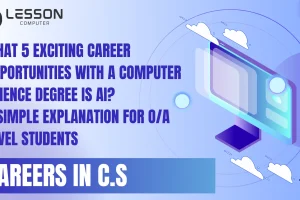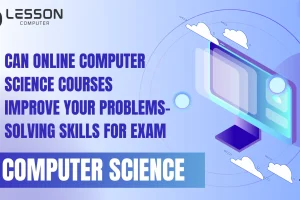
What Is O-Level Computer Science? – What You Need to Know!
O-Level computer science is the study of programming, algorithms, data representation and security, computer systems, networking, and computer ethics. It provides students with basic knowledge and skills in coding, logic, and digital technology.
This article will learn the importance of O-Levels and how they help students build useful life skills.
Most Important Topics O-Level In Computer Science
The important topics in O Level computer science are:
- Programming Language
- Algorithms
- Data Representation
- Computer System
- Networking
- Data Security
- Computer Ethics
1. Programming language:
A programming language is a set of instructions written by a programmer and given to the computer to perform and complete a task. This set of instructions is usually viewed as an unclear code structure following a programming language syntax.
A programming language is a rare set of instructions that helps computers communicate. There are different types of programming languages, all designed for particular tasks or purposes.
2. Algorithms:
An algorithm is like a receipt that tells a computer what steps to take to solve a problem or complete a task. It has a clear start, and the steps are done in a specific manner to get the job done.
The algorithm is paired many times with words identifying the activity for which a set of rules has been designed. For example, a procedure that determines what kind of information is received from a large amount of data.
3. Data Representation:
Data representation is the process in which data is stored and shared. Devices like smartphones and computers save data in a format like electronic which their parts can understand. This includes changing real-world data, like pictures, sounds, texts, and numbers, into binary form that computers can use.
4. Computer System:
A computer system is developed with different parts like hardware physical components, software programs, and other parts that help process data. It includes an input part to give data, a processing unit, and an output part.
A combined computer system means that all the parts work together as one system.
5. Networking:
when people share information and ideas, normally around a shared business or interest is called networking. Professionals network to grow their contacts, understand job opportunities and get updated on important news or changes in their industry.
However, networking often takes place without being asked when two or more like-minded professionals cross paths.
6. Data security:
Data security is the process of protecting digital information all over its entire life cycle to protect it from duplication, theft, or unauthorized access. It covers hardware, software, storage devices, and user devices; access and management controls; and organizations’ policies and procedures.
There are many reasons why data security is important to organizations all over the world. Organizations are legally made to protect customer and user data from being lost or stolen and ending up in the wrong hands.
7. Computer Ethics:
Computer ethics is the set of regularly used principles that control the use of computers. Like ethics more generally, computer ethics is a set of logical guidelines or moral standards that aim to control behavior and stop harm.
- You make IT for everyone: IT professionals work in the public interest, with due regard paid to privacy, security, public health, and the well-being of others and the environment.
- Show what you know, and learn what you don’t: IT professionals should only take on tasks that they have the competencies, skills, and resources to complete.
- Respect the organization or individual you work for: IT professionals should always act in the best interest of their client or company, and maintain discretion and ethical standards.
- Keep IT real. Keep IT professional. Pass IT on: IT professionals should always act with integrity, and support colleagues in their personal and professional growth.
Skills Developed After O-Level:
- Problem-solving skill
- Logical thinking
- Technical abilities
1. Problem-solving skill:
Problem-solving skills are the ability to identify problems, plan and analyze answers, and apply the best solutions. An employee with good problem-solving skills is both a self-starter and a cooperative teammate; they are proactive in understanding the root of a problem and work with others to consider a wide range of solutions before deciding how to move forward.
Examples of problem-solving skills are:
- Analyzing patterns to understand why earnings decreased last month.
- Make research with a new marketing strategy to increase website reach.
- Imagine content types to share with potential customers.
- Testing the action buttons to see which ones drive the most product sales.
- Perform a new exercise to automate a team process and increase productivity.
2. Logical thinking:
The definition of logical thinking is examining a situation or problem using reason and coming up with potential solutions. Logical thinkers collect all the information they can, access the facts, and then carefully decide the best way to move forward.
However, It is an important tool in the workplace to help analyze problems, plan ideas, and find answers.
Some examples of logical thinking are:
- Deduction
- Thought process
- Top-down reasoning
3. Technical abilities:
Technical skills refer to the expertise and knowledge needed to fulfill difficult processes, tasks, or actions relating to physical and computational technology. Individuals who possess technical skills are usually referred to as “technicians,” with the expression referring to engineering technicians, computer technicians, market technicians, electronics technicians, audio technicians, and a variety of other designations.
- Programming
- Project management skills
- Information security
- Technical support
- Industry-specific skills
What are the subjects for Computer Science at the O level?
O-Level Computer Science, students are generally required to have a strong foundation in core subjects. They need at least five ‘O’ Level credit passes, including English Language, Mathematics, and Physics, which are essential for understanding programming, algorithms, and hardware concepts. In addition to these, students must choose two other science subjects, such as Chemistry or Biology, to meet the academic requirements. This combination of subjects ensures that students develop the necessary skills and knowledge to pursue higher studies or a career in computer science.
What is the easiest subject in O-levels?
One of the easiest subjects in O Levels is Sociology. It simplifies the study of social behavior, human interactions, and how societies function. Students find it manageable because it focuses on real-life topics and concepts that are easier to relate to and understand. With straightforward theories and less technical content compared to science subjects, Sociology offers an accessible option for students who prefer exploring social dynamics over complex calculations or memorization.
What is the hardest subject at the O level?
The hardest subjects in O Levels are typically Mathematics, Physics, Chemistry, and Biology. These subjects are challenging because they require strong problem-solving skills, detailed understanding, and lots of practice. To do well, it’s important to start studying early and plan your revision to cover all topics. Regular practice with past papers, breaking down difficult concepts, and seeking help from teachers or tutors can make these subjects more manageable.
Is computing at the O level subject?
Yes, Computing is offered as an O-Level subject. While basic ICT programs focus on developing essential computer literacy, the O-level computing curriculum goes further by teaching students more advanced concepts like programming, algorithms, data handling, and problem-solving skills. This subject aims to spark students’ interest in technology and prepare them for future studies or careers in computer science.
Which subject is best for the O level?
The best subjects for O Level depend on a student’s interests and future goals.
However, for those aiming for STEM programs at AS/A Level or university, a strong combination includes Physics, Chemistry, Biology, or Computer Science, along with Additional Mathematics. These subjects provide a solid foundation for careers in engineering, medicine, computer science, and other science-related fields. Students who prefer a broader focus can also include Humanities or Environmental Science to explore different areas of interest.
What are the O-level requirements for Computer Science?
To pursue a degree in Computer Science, students must have at least five O Level credit passes. These should include English Language, Mathematics, and Physics, which are essential for understanding programming and computer systems. In addition, students must pass two other science subjects, such as Chemistry or Biology, to meet the academic requirements. This combination ensures they have a strong foundation for advanced studies in Computer Science.
Which grade is needed in Computer Science?
To excel in Computer Science, students typically need at least a C grade or higher at the O Level. However, aiming for an A or A+ grade is recommended for students planning to pursue advanced studies or careers in technology fields. A higher grade demonstrates a strong understanding of programming, algorithms, and computer systems, which can improve opportunities for admission to A Level programs or university courses.
What is the passing score for the O level?
The passing score for O Level exams varies by subject. Generally, a C6 or higher is considered a pass. However, for specific entry requirements like Junior College (JC), students need:
- L1R5 score (English + 5 relevant subjects) of 20 or below
- Pass in English with at least C6
- Pass in Math with at least D7
- Pass in Mother Tongue with at least D7
What are the 4 levels of computer science?
The four levels of computer science are:
1. Digital Logic Level:
This is the foundational level where the basic building blocks of computers, like gates and circuits, are studied. It focuses on how data is represented in binary form and how logical operations are performed.
2. Microarchitecture Level:
At this level, the design and organization of computer hardware components, such as the CPU, memory, and data pathways, are explored. It examines how these components interact to execute instructions.
3. Instruction Set Architecture (ISA) Level:
This level defines the set of instructions that a computer can execute. It includes how instructions are formatted and the operations they perform, acting as a bridge between hardware and software.
4. Operating System (OS) Level:
This level focuses on the software that manages hardware resources and provides services for computer programs. It covers topics like process management, memory management, and file systems, ensuring that applications run smoothly on the computer.
What is cs in o level?
In O Levels, Computer Science (CS) is a subject that primarily introduces students to computer systems and algorithmic design rather than focusing heavily on actual coding. Students learn about how computers work, the principles of algorithms, and problem-solving techniques.
Most of the time, they will use pseudocode, which is a way to outline algorithms in a simple, readable format. Pseudocode helps students organize their thoughts and understand programming logic without needing to know a specific programming language. This approach builds a strong foundation for future studies in computer programming and software development.
FAQs:
Students can learn how a computer works, how to write programs, and how to solve problems using technology. They can also study topics like data handling, computer systems, and networks.
Yes, programming is an important part of the subject, but students also explore other areas like how data is stored, how computers connect, and how to keep information safe.
This subject helps you understand how technology works, which is useful in many jobs. It can lead to careers in IT, software development, cybersecurity, and many more.
It can be a bit difficult, but with practice, you will get better at problem-solving and programming. The subject teaches you step-by-step, making it easier to learn.
Yes, understanding computers and technology helps in everyday tasks, like data management, staying safe online, and using different digital tools effectively.
Conclusion:
O-Level Computer Science trains students in difficult problem-solving skills, calculation thinking, and programming. Main topics include programming languages, algorithms, data representation, computer systems, networking, data security, and computer ethics. This article helps students understand how to use computers successfully and develop essential life skills, making O-Level Computer Science valuable for both academic and personal growth.
Discover more from Lesson Computer
Subscribe to get the latest posts sent to your email.



